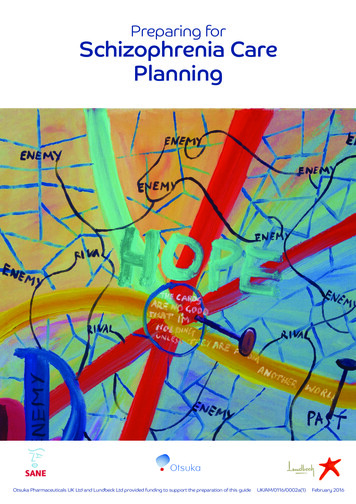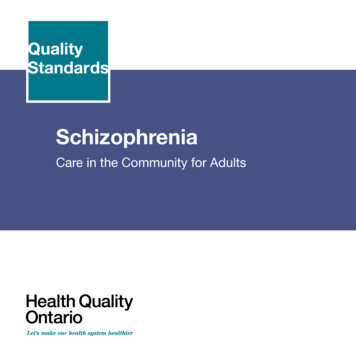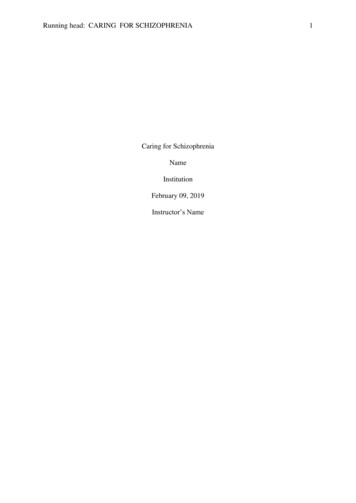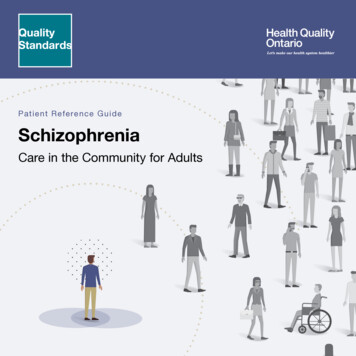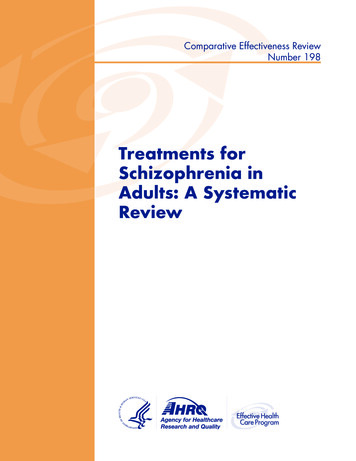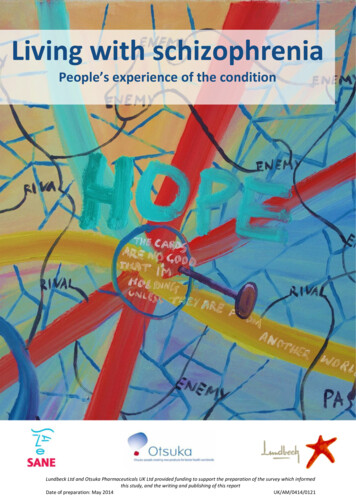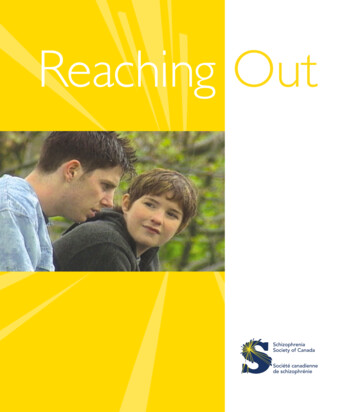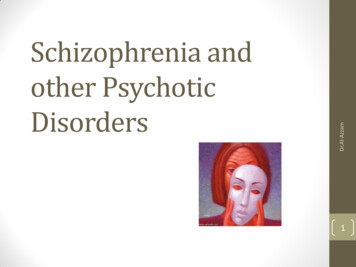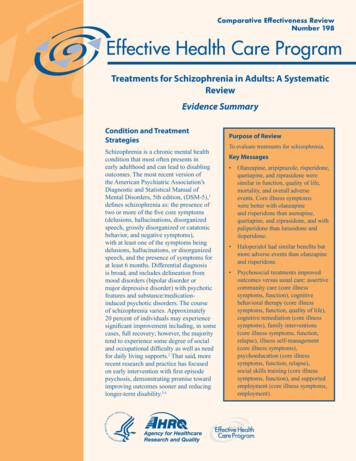
Transcription
hopesupportcareAnnual Report 2017–2018
Our mission and goals are at theheart of everything we do. Throughour programs and activities, westrive to: reduce stigma througheducation and awareness; supportindividuals and families; advocatefor improved services andtreatments; and support research.
Whowe are2017-2018 SSCExecutive Committee:Florence BuddenPresidentJoan BaylisTreasurerDonna MethotMember-at-LargeDr. Lori Triano-AntidormiMember-at-LargeChris SummervilleEx-Officio2017-2018 SSCBoard of DirectorsThe Schizophrenia Society of Canada’s Boardof Directors is comprised of representativesassociated with the provincial schizophreniasocieties across Canada, as well as five directorsat-large. The SSC board is responsible to its “letterspatent” in governing the affairs of SSC. SSC aswell as each provincial schizophrenia society is anindependent, autonomous charity with its ownboard of directors, by-laws, governance model,values, and CRA charitable registration number.Our board members are:Sylvie MaréchalSociété Québécoise de la SchizophrénieFlorence BuddenSchizophrenia Society of Newfoundland and LabradorDonna MethotSchizophrenia Society of Nova ScotiaColleen CrossleyBritish Columbia Schizophrenia SocietyGregory ZedSchizophrenia Society of New BrunswickDoug TiltmanManitoba Schizophrenia SocietyJeff JamesSchizophrenia Society of SaskatchewanAamir MianSchizophrenia Society of OntarioGail MacLeanSchizophrenia Society of Prince Edward IslandDr. Lori Triano-AntidormiDirector-at-Large, OntarioLaura BurkeDirector-at-Large, Nova ScotiaDr. Philip TibboDirector-at-Large, Nova ScotiaHazel MeredithDirector-at-Large, British ColumbiaJoan BaylisDirector-at-Large, OntarioStaff:Chris SummervilleChief Executive OfficerKatrina TinmanAdministrative AssistantCatherine WillinskyProject Manager1 Schizophrenia Society of Canada Annual Report 2017–2018
About theSchizophrenia Societyof CanadaOur Purpose:SSC Core Values:The Schizophrenia Societyof Canada (SSC) is a nationalregistered not-for-profit charitywith a mission to improve thequality of life for those affectedby schizophrenia and psychosisthrough education, supportprograms, public policy andresearch. Founded in 1979, weare proud to celebrate morethan 39 years of hope, inclusion,change and innovation.The SSC values provide furtherclarity on what the Society standsfor and what it sees as importantfor improving the quality of lifefor individuals with schizophreniaand their families. The valuescomplement the Society’scorporate objectives (purpose)and its mission. To be a memberof SSC, persons need to indicatetheir agreement with the Society’sobjectives, mission and values.The Board of Directors ispassionate in its commitment to: Raising awareness and educatingthe public to help reducestigma and discrimination. Supporting familiesand individuals. Advocating for legislativechange and improved access totreatment options and services. Supporting research throughthe SSC Foundation andother independent efforts.The SSC’s core values are as follows: Schizophrenia and psychosisare medical illnesses that,like other medical illnesses,have variable expressions andeffects of symptoms, functionand response to treatments. Schizophrenia and psychosis arecaused by a number of differentfactors; from multiple geneticor environmental factors orfrom a combination of both. The SSC fully supports theimportant role of research in allareas related to schizophreniaand psychosis (biological,psychological, spiritual, andsocial determinants of health). Persons with schizophreniaand psychosis are entitled toperson-centred, efficient multidisciplinary and integrated2 Schizophrenia Society of Canada Annual Report 2017–2018 evidence-informed treatment andcommunity support services.Persons at the early phases oftheir illness are entitled to realsecondary prevention (earlyintervention and treatment)through specialized firstepisode psychosis clinicsand their collaborators.Persons with schizophrenia andpsychosis are to be includedas full citizens in accessingeducation, employment,housing, medical services,recreation and social supports.Whenever possible familiesare essential partners in thecare and the treatment andrecovery plans of persons withschizophrenia and psychosis, anddeserve respect and support.Persons with schizophrenia andpsychosis must be includedin their treatment planning,care and recovery plans usinga shared decision approach.Persons with schizophrenia andpsychosis and their families arenot to be blamed for this illness.The SSC values collaboration atall levels to ensure that caring,compassion, hope, inclusion,and recovery remain at theheart of our movement.
Recovery frommental illness ispossible but it takesthe support of acaring community!
What we knowabout Schizophreniaand PsychosisSchizophrenia is a serious but treatable braindisorder. No single cause has been found forschizophrenia, although there is a clear geneticlink. As well, environmental and social factors areinvolved in the development of schizophrenia.Schizophrenia usually is a long-term mental healthproblem. People with schizophrenia can have a rangeof symptoms including periods when they cannottell the difference between what is real and whatis imagined. Schizophrenia can seriously disturbthe way people think, feel and relate to others.Psychosis affects 3% of the population at anygiven time. While psychosis can be a symptom ofa number of illnesses and conditions, it is the mainfeature of schizophrenia. Schizophrenia can impactanyone. It usually develops into a full-blown illnessin late adolescence or early adulthood and affectsan estimated 1 in 100 Canadians and their families.Men and women are affected equally; however, mentend to have their first episode of schizophrenia intheir late teens or early 20s. For women, the onset isusually a few years later. In most cases, the symptomsdevelop gradually. In some cases the onset is rapid.The illness is characterized by delusions,hallucinations, disturbances in thinkingand withdrawal from social activity.4 Schizophrenia Society of Canada Annual Report 2017–2018Schizophrenia is one of the most widelymisunderstood and feared illnesses insociety. The lingering stigma and mythsassociated with this illness often resultin discrimination and, consequently, areluctance to seek appropriate help.Schizophrenia is treatable and recoveryis possible with individuals developingpositive mental health and resiliency.Patients have the choice of long-actingtherapies that are available ugs-effective-for-schizophrenia/article/786182/. But, it still takes asupportive and caring community offamily and friends and colleagues. Andthe best mental health services arethose closely tied to primary care andsocial care.
Message fromthe President andChief Executive Officerof SSCFlorence Budden, PresidentChris Summerville, CEOOur History:Our Purpose:The Schizophrenia Society ofCanada (SSC) was founded in 1979by Bill Jefferies and his wife Dorothy.Bill had two brothers and a sonwho developed schizophrenia andhe set out to change the world’sawareness of the illness. After a 30year teaching career he placed asmall ad in an Oakville newspaperasking families with a memberliving with schizophrenia to attenda meeting to “share and educate”.About 80 people attended thatfirst meeting in a local churchbasement. At that time there wasvery little advocacy or supportsavailable for families, and virtuallyno supports outside hospitalsettings for persons living with amental illness. Mr. Jefferies knewthat one of the best ways to help theperson living with schizophreniawas to provide support servicesto struggling families.SSC envisions a society absent ofnot only schizophrenia, but alsoone free of stigma, social prejudice,and discrimination towardspeople living with schizophreniaand psychosis, along with theirfamilies. Furthermore, throughthe Schizophrenia Society ofCanada Foundation we envisiona day when there is a cure forschizophrenia and psychosis.The SSC mission of improvingthe quality of life for individualsliving with schizophrenia andpsychosis, their families, and othersin their circle of support can beexpressed in the following way: That no matter what illness aperson may have, he/she istreated as a person first. That one experienceslove and fellowship in thecontinuity of their life. That one is respected andtreated with dignity.5 Schizophrenia Society of Canada Annual Report 2017–2018 That one has equal access toopportunities and informationthat enable decision making andthe exercise of applicable rights. That one has opportunitiesto learn the skills neededto participate in society. That one has an acceptableplace to live. That one has meaningfulemployment and contributesto the community. That one has educationopportunities throughout life. That one has an adequateincome to provide for basicneeds, plus some extras. That one receives access to totalmedical care and appropriatecommunity support servicesthat promote recovery. That one is free from the effectsof stigma and discrimination.
Our Future:It was an ambitious year for theSSC. We concluded our firstenvironmental scan under theleadership of Neasa Martin andAssociates. After consultation withstakeholders such as other mentalhealth organizations, members ofthe Canadian Alliance on MentalHealth and Mental Illness, theMental Health Commission ofCanada, psychiatrists, serviceproviders, family members, andthose living with schizophreniaor psychosis, the next step wasconducting a survey that wasdistributed through the provincialschizophrenia societies and theirmembers and constituents. The SSCBoard of Directors accepted the finalreport and its recommendations.The board decided that the futuredirection of and any strategicplanning by SSC, should be basedupon the findings of the survey.The survey in summary stated:The result of the environmentalscan provides a clear mandate tothe SSC. People see its value andwant action! The need to conveya clear understanding of who theSSC represents, serves, and wantsto influence was an identifiedpriority amongst internal andexternal stakeholders. Setting a fewagreed upon priorities was seenas essential in focusing its limitedresources in order to achieveimpact. As a national organizationthe SSC’s primary focus should beon education around schizophreniaand psychosis, influencing policyand best- practice decisions byconnecting community needs tonational decision-making. TheSSC can help to track emergingresearch and treatment trendsand identify priority issues. It cangather and share best practiceresources from across the countryand internationally. This can lead todeveloping new tools and resourcesthat can be shared nationwide.Support and service delivery,engaging provincial and regionalgovernments, and working withservice providers and communitysupports remains the responsibilityof the provincial societies. Thiswork can be strengthened bynational policy documents andeducational tools. The SSC cancontinue to be a trusted voice onnational issues and advocate foractions that will improve lives.Organizations that do notevolve with changing times faceextinction. This environmentalscan provides a clear sense thatthe road the SSC is on is a valuedone. It is time to reinvent, renewand revitalize the Society. Make itmore open and inclusive. Changethe narrative around schizophreniaand psychosis to remove thebarriers to inclusion and fight forwhat are legitimate but unmetrights. Our strength will be ourpartnerships – with our members,our stakeholders, our governmentand our community partners.Strengthening partnershipswas a consistent theme acrossinternal and external stakeholderinterviews. Current financial andhuman resource limitations makecollaboration with others workingon common issues a critical meansof expanding the influence of theSSC. 84% of survey participantsalso agreed that partnership andcollaboration on national issuesshould be a key priority. 83%feel addressing inequalities froma human rights perspective isa priority. Some respondentsrecommend engagement at aprovincial, regional and locallevel with government, planners,emergency and police servicesand front-line hospital staff,mental health service providersand community agencies. This isbeyond the national mandate butcan be important targets for theprovincial schizophrenia societies6 Schizophrenia Society of Canada Annual Report 2017–2018across Canada. Building nationalvisibility and momentum can helpsupport this local grass roots work.Some examples include: workingwith human rights, social justice,anti-poverty groups, and withorganizations such as the MentalHealth Commission of Canada,the Canadian Consortium forEarly Intervention Psychosis, theCanadian Mental Health Association,the John Howard Society, theElizabeth Fry Society, etc.Much has changed since theformation of the Societies in 1979.Unfortunately, there have beenhistorical divisions between the SSCand the provincial Societies. Thesurvey and stakeholder interviewsreveal that there is a greater levelof agreement on core ideas suchas expanding the Society beyond afamily voice, the value of promotingrecovery, hope and optimism,broadening the messaging onunderstanding and treatingschizophrenia and psychosis andthe importance of including mentalhealth and wellness. Most peopleagree with adopting a broaderfocus on the social determinantsof health and applying a humanrights and social justice lens toadvocating for equity and accessto recovery-focused services. Asmall but vocal number of familymembers have created divisionsthat cause a loss of momentumand undermine influence withgovernment. The SSC has its ownarea of responsibility that is differentfrom the provinces. Its work will bestrengthened by building a strongerpartnership of mutual respect andinterest. Less attention must be paidto the vocal fe
recovery plans of persons with schizophrenia and psychosis, and deserve respect and support. Persons with schizophrenia and psychosis must be included in their treatment planning, care and recovery plans using a shared decision approach. Persons with schizophrenia and psychosis and their families are not to be blamed for this illness. The SSC values collaboration at all levels to .
